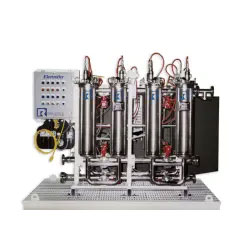Description
Why Choose an Auto Backwash Filter System?
- Prevents process/system downtime
- Minimizes operator exposure
- Cuts maintenance cost
- Reduces labor costs
- Eliminates filter element disposal and replacement cost
- Increases productivity
Self-cleaning filters represent the ideal situation and provide the most productive and labor free solution. ABW is unique because our patented technology backwashes with a very low volume of liquid. This is achieved by using air pressure to create the shear velocity needed to effectively clean the filter element.
Flexible and Versatile Automatic Backwashing System
Flow rates from less than a hundred to several thousand GPM can be accommodated. Also, to meet footprint or space requirements, we can configure the systems as needed. Removal ratings from 5 micron and larger are available in a variety of filter media including standard bags, wire cloth and wedgewire. Continuous flow is maintained by taking one station at a time off-line for cleaning – the rest of the housings continue filtering.
Turnkey Systems for Backwashing Automatic System
Our systems have included air compressors, pumps, power distribution boxes, motor starters, climate controlled enclosures, heat trace and air dryers, all skid mounted and ready for installation
How an Automatic Self Cleaning Backwash Filter Works
Fluid is introduced through the lower portion of the filter housing. It is then flows through a filter element where the contaminant is captured on the outside surface. As clean fluid exits through the outlet, a controller monitors the differential pressure across the filter. When enough contaminant collects on the element and the differential pressure reaches a pre-selected point (^P), the backwash sequence is initiated. The backwash is accomplished by automatically shocking the filter with air or gas, which forces the liquid through the waste outlet. There is no introduction of additional fluids to contaminate the process, and the liquid discharged is only the volume of filter housing, thus reducing disposal costs. When the backwash operation is completed, the system returns on-line, the controller resets itself, and the whole process begins again. The backwash process lasts about 15 seconds.




